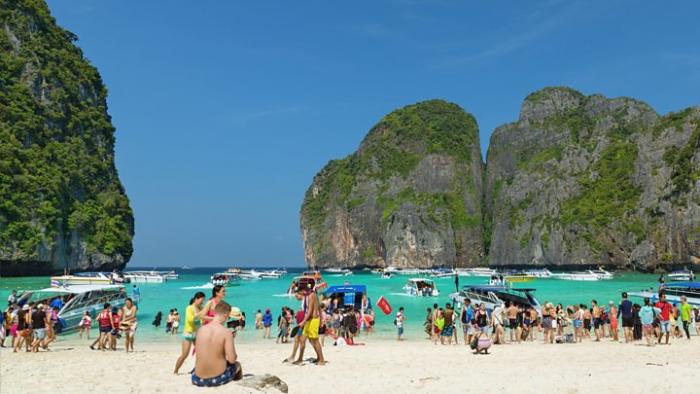How One Movie Caused a Tourism Shutdown
FTC Statement: Reviewers are frequently provided by the publisher/production company with a copy of the material being reviewed.The opinions published are solely those of the respective reviewers and may not reflect the opinions of CriticalBlast.com or its management.
As an Amazon Associate, we earn from qualifying purchases. (This is a legal requirement, as apparently some sites advertise for Amazon for free. Yes, that's sarcasm.)

We all remember the first time we watched “The Beach” starring Leonardo DiCaprio. There was something about the pristine blue waters and secluded bay that stirred in us a feeling of wanderlust and almost got us off the couch and on a plane to Thailand. In fact, this is exactly what happened in the years that followed the blockbuster release in 2000. Thousands of visitors from all around the globe landed in Bangkok looking for adventure and especially the fabled cove, which producers chose as the location for the hidden island.
It turns out that we all had the same idea. Once the location was discovered, the tourism industry responded in kind, willingly taking Dollars, Euros and any other currency in exchange for a boat trip to the holy grail of beaches. Unfortunately for those who travelled halfway around the world, flogging everything they owned and possibly incurring a large “holiday loan”, the destination was not one of softly lapping waves and exclusivity, but rather a hording mass of tourists wallowing about in the shallows taking selfies and tweeting about finding “The Beach”
This has been going on for years now, 18 to be exact and the number of tourists has not let up. In fact, the bay has become such a popular destination that there are now scheduled boats running every half hour to the bay. More money is made from that one beach than from some of the biggest online betting sites. The area currently receives a few thousand visitors a year, all wanting the same experience. Unlike many other tourist destinations and activities though, this highly sensitive ecological area is not able to consistently sustain such large amount of tourist traffic.
Maya Bay Closed to Tourists
This has now led Thai authorities to give the bay a break from the tourists. This year, for the very first time, Maya Bay on Phi Phi Leh Island will be closed to tourists in order to give its coral reefs and sea life a chance to recover, so there will be no access during the day, or for those who enjoyed star gazing on the sands at night either. This is a very unusual for Thailand, who is big on tourism and offers unfettered access to just about every inch of their lush paradise. However, in order to create a balance between conservation and profit, the closure is necessary and urgent.
This is not the first Asian or international tourism site to consider closing its doors to tourists. In fact, many popular attractions and historical venues around the world have been rethinking offering unrestricted access to overseas visitors. While they may bring in big money, the damage sustained by the historical sites and the alienation of the locals outweighs the pros. For Thailand, it is a simple case of if the visits continued, there would be no beach left.
The good news for those who have Thailand on their bucket list is that the closure is only temporary and will happen every year. This is actually the perfect solution to the problem. On one hand, it gives the area a chance to recover and the sea life to return and on the other, it offers tourists as sustainable future to the island.


